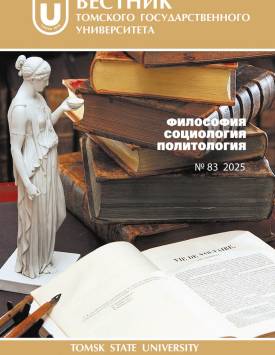Empiriocritical “realism” and edmund Husserl’s “lifeworld”
The article discusses theoretical propositions of “principled empiriocritical coordination” and “naive realism” in connection with the phenomenological concept of the “lifeworld”. At the beginning of the article, the author notes that in connection with sociopolitical events in Russia, in the early twentieth century, disputes even within the framework of dialectical materialism and Marxism went far beyond philosophical ones. After the publication of Lenin's work “Materialism and Empiriocriticism” in 1909 for many years, up to the 1990s, the philosophy of empiriocriticism, including Russian one, existed as a kind of “reactionary, bourgeois” subjective idealism. The objectives of the research are, firstly, to fill in the “gap” in the study of empiriocritical philosophy to some extent, especially the philosophy of the “Russian Machists”, by analyzing primary texts, and, secondly, to overcome the stereotype about contradictions purely within the framework of “materialism -idealism” in relation to the philosophy of empiriocriticism, and to determine points of contact between the ideological provisions of Richard Avenarius's “principled coordination”, Vladimir Bazarov's and Anatoly Lunacharsky's “naive” and “living” realism with the concept of the universal “lifeworld” in the late philosophy of Edmund Husserl. In the body of the article, the author notes the fact that empiriocritics themselves, unlike Lenin, did not consider the classical opposition of materialism and idealism fundamental; therefore, the conclusion is that it is necessary to refer to the texts of empiriocritical philosophers themselves. Further, the development o Avenarius' thought is shown in relation to the idea of “principled empiriocritical coordination” of “self” and “environment” as two members of an inseparable “lifecycle” as the natural basis or foundation of any further cognitive construction. The following statement shows the points of contact between the concepts of a realistic worldview within the framework of the philosophy of “Russian empiriocriticism” and the phenomenological theory of Husserl's “lifeworld”, which are considered as a universal basis or “soil” for the entire cognitive “horizon” against the background of criticism of natural science and mapping of life reality. As a result, the author concludes about the development of independent, but similar ways of thinking within the framework of empiriocritical philosophy, including Russian one, and phenomenology. The author declares no conflicts of interests.
Keywords
“lifeworld”, naive realism, “Russian empiriocriticism”, principled coordinationAuthors
| Name | Organization | |
| Korotysheva Natalia N. | Vyatka State University | nnpoluyan@inbox.ru |
References

Empiriocritical “realism” and edmund Husserl’s “lifeworld” | Tomsk State University Journal of Philosophy, Sociology and Political Science. 2025. № 83. DOI: 10.17223/1998863X/83/3
